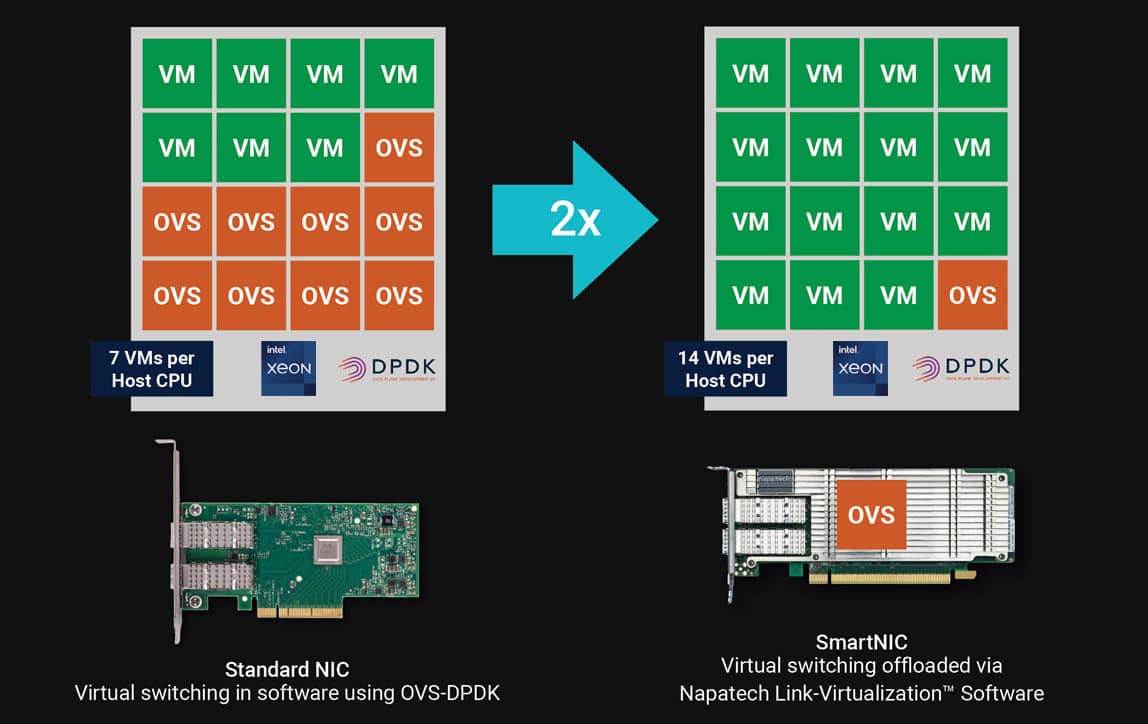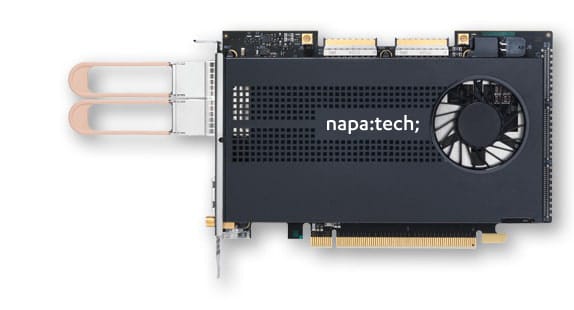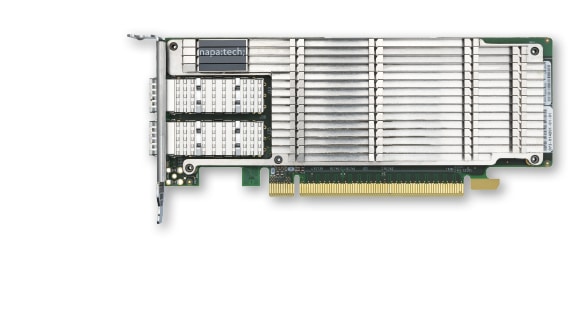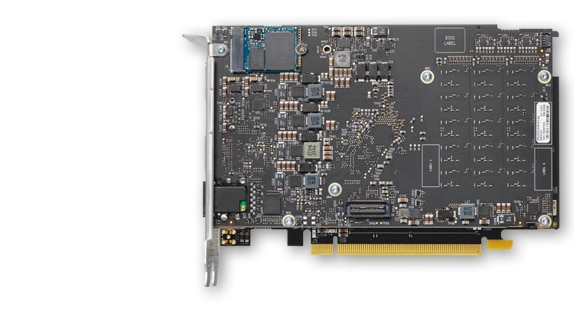![]()
Link-Virtualization™ Software
for FPGA-based SmartNICs and IPUs
Napatech Link-Virtualization™ Software provide a hardware-based solution for virtual switch offload, dramatically increasing performance while reducing CPU consumption. The Link-Virtualization Software offloads and accelerates the Open vSwitch (OVS) dataplane to provide increased network performance and much better CPU efficiency with lower complexity and enhanced scalability than alternatives.
Link-Virtualization Software supports a broad range of applications and use cases delivering significant reductions in operating cost and improvements in energy efficiency for both cloud and edge data centers.
Key Benefits
Offloading the virtual switching function from the server’s host CPU to a programmable SmartNIC running Napatech’s Link-Virtualization software results in significant reductions in CAPEX, OPEX and power consumption for edge and cloud data centers.
![]()
High Performance
Scale networks to 100Gbps and 60Mpps to the host
![]()
Significantly Reduced CPU Utilization
Return CPU cores to applications and services
Total Cost of Ownership
Cost effective scaling for your data center
Reconfigurability
Completely programmable for custom requirements
Environmentally Sound
Lower power, space, and cooling
Solution Overview
Within cloud and edge data centers, the efficient utilization of server compute resources is key to maximizing overall Return on Investment and energy efficiency.
In virtualized environments, infrastructure handling consumes a significant portion of compute resources. Operators need to minimize the compute resources and energy used by infrastructure virtual switching and release these back to applications and services generating revenue.
Napatech’s Link-Virtualization Software and FPGA-based SmartNICs offer a 60x performance improvement compared to alternative approaches and saves significant CPU resources.
To find out more see:
Link-Virtualization Software Product Brief
Watch video: By offloading virtual switching from server CPUs to programmable Smart Network Interface Cards (SmartNICs), operators of edge data centers free up CPU cores to run additional revenue-generating applications and services, resulting in compelling CAPEX and OPEX reductions.
Presented by Napatech Senior Director Business Development Charlie Ashton.
vSwitch offload ROI analysis tool
Using this interactive tool, you can estimate the Return on Investment (RoI) benefits that your specific use case could be expected to achieve by using a Napatech SmartNIC, together with the Link-Virtualization software, to offload virtual switching from your server’s CPU. Based on your inputs that characterize your workload, your server configuration and your data center, the tool calculates your expected savings in both CAPEX and OPEX over the analysis period that you specify.
The tool is easy to understand:
• Your inputs go in the purple cells, which are the only cells in the worksheet that are editable;
• The numbers in the grey cells represent intermediate calculations;
• The important results, reflected in the charts, are in the blue cells;
• And if you have any questions, or need a different approach to this kind of analysis, our experts are here to help.
First, let’s get started by calculating the improvement you can expect in Virtual Machine density….
- From the first drop-down menu, select the total number of CPU cores in each of your servers.
- From the second drop-down menu, select the packet size that best represents your network traffic.
- Enter the total bidirectional bandwidth (in millions of packets per second) that is required for each Virtual Machine (VM). For reference, the worksheet will also express this in terms of gigabits per second, based on the packet size that you specified above.
- From the “NIC Assumptions” drop-down menu, select the throughput of your chosen NIC for both the OVS-DPDK and SmartNIC Offload scenarios.
- In the section “Optimum Configuration of CPU Cores”, select one vSwitch core for the SmartNIC scenario if the OVS slow path runs on the host CPU, or zero if the slow path is offloaded to the SmartNIC.
Next, let’s use the second part of the worksheet to see how your VM density improvement leads to quantifiable financial savings:
- Enter the total number of VMs that you need to run in your data center.
- Enter your best estimate of the unit cost for your servers, as well as for the NICs.
- Enter your OPEX-related inputs such as typical server OPEX as a percentage of CAPEX, NIC power, cost of power and Power Usage Effectiveness (PUE).
- Enter the typical length of your server refresh cycle and indicate what time period you’d like to use for the analysis of CAPEX and OPEX savings.
Based on this final set of inputs, the worksheet calculates the CAPEX and OPEX savings that you can expect to achieve by offloading the vSwitch function onto a SmartNIC, for the specific use case and configuration that you’ve defined.
If you have questions about the operation of this worksheet, or you’d like to be able to estimate the benefits of vSwitch offloading through a different approach, please contact us so our experts can help with your analysis.
| Performance Assumptions | OVS-DPDK | SmartNIC Offload | ||||||||
| Total number of cores per server | 16 | Switching bandwidth per core (Mpps) | 8 | All offloaded | ||||||
| Virtual Infrastructure Manager (VIM) cores | 1 | Gbps | 5.376 | |||||||
| Number of cores per VM | 1 | |||||||||
| Packet size (Bytes) | 64 | NIC Assumptions | OVS-DPDK | SmartNIC Offload | ||||||
| Bandwidth required for each VM (Mpps) | 20 | Throughput (Gbps) | 50 | 100 | ||||||
| Gbps | 13.44 | |||||||||
| Optimum Configuration of CPU Cores | OVS-DPDK | SmartNIC Offload | ||||||||
| VM cores | 4 | 14 | ||||||||
| Total switching bandwidth required (Mpps) | 80 | 280 | ||||||||
| Gbps | 53.76 | 188.16 | ||||||||
| vSwitch cores | 10 | 1 | ||||||||
| VIM cores | 1 | 1 | ||||||||
| Unused cores | 1 | 0 | ||||||||
| Number of NICs required per server | 2 | 2 | ||||||||
| Cores reclaimed for VMs | 10 | |||||||||
| VM density improvement (x) | 3.5 | |||||||||
| Scaling Assumptions | ROI Analysis | OVS-DPDK | SmartNIC Offload | |||||||
| Total number of VMs required | 1000 | Total number of servers required | 250 | 72 | ||||||
| Server cost ($) | 4000 | Total number of NICs required | 500 | 144 | ||||||
| Annual server OPEX as % of CAPEX (%) | 25 | NIC cost (hardware + software) ($) | 500 | 1500 | ||||||
| Server power (W) | 400 | NIC power (W) | 15 | 25 | ||||||
| Cost of power (¢ per kWh) | 8 | Server refresh cycle (Years) | 3 | 4 | ||||||
| Data center Power Usage Effectiveness (PUE) | 1.2 | Server refreshes after deployment | 1 | 1 | ||||||
| Timeframe for CAPEX / OPEX analysis (Years) | 5 | Total server cost ($) | 2000000 | 576000 | ||||||
| Total NIC cost ($) | 500000 | 432000 | ||||||||
| CAPEX ($) | 2500000 | 1008000 | ||||||||
| CAPEX savings from using SmartNICs ($) | 1492000 | |||||||||
| Total server OPEX over analysis period ($) | 1250000 | 360000 | ||||||||
| Total power consumption over analysis period (MWh) | 5650 | 1703 | ||||||||
| Cost of power over analysis period ($) | 452000 | 136240 | ||||||||
| OPEX ($) | 1702000 | 496240 | ||||||||
| OPEX savings from using SmartNICs ($) | 1205760 | |||||||||
Disclaimer: This tool is intended for informational purposes only. Any information herein is believed to be reliable, however Napatech assumes no responsibility for the accuracy of the results produced. Napatech disclaims any and all liabilities.
CPU Core Utilization
OVS-DPDK
[supsystic-table-diagram id=’22’]
SmartNIC Offload
[supsystic-table-diagram id=’23’]
Key Features
Link-Virtualization Software for Napatech
Napatech Link-Virtualization Software provides the Napatech SmartNIC family with a robust feature set and extendable architecture allowing plug-and-play virtualized dataplane offload support for Napatech SmartNICs. Key features are listed below.
![]()
Full offload of the virtual switching data plane
Up to 60M pps data delivery to virtualized applications
100Gbps switching throughput
Configurable match processing for L2, L3, L4
VLAN / QinQ / VxLAN support
1000 megaflows, millions of individual flows
Based on standard OVS and DPDK
Extensive actions
VirtIO / live migration support
Load balancing
Port mirroring
QoS
Link-Virtualization Performance Demo
Napatech’s hardware-based OVS offload solution offers a 6X gain compared to OVS DPDK and 60X gain compared to OVS kernel in performance, while reducing the CPU cycle consumption by as much as 90% compared to alternatives. While kernel based or user space (DPDK) versions of OVS are incredibly CPU intensive with network intensive workloads, Napatech’s SmartNICs and Virtualization software accelerate OVS and provide much better CPU efficiency, lower complexity, enhanced scalability and increased network performance.
Tested with 64byte frames, 1024 megaflows, 8 million individual flows.
For virtualized application hosting, OVS is the default solution for demultiplexing traffic from the network to, from, and between applications running in VMs or containers. Software-only implementations of OVS, though, fail to meet the performance and scale requirements of virtualized applications. Additionally, running OVS in software, which is the standard practice, uses significant CPU resources simply for directing traffic, stealing those CPU resources from revenue generating applications.
VM-to-VM Monitoring
VM-to-VM Monitoring provides insight into both North-South and East-West data in virtualized servers without consuming CPU cores.
Link-Virtualziation VM-to-VM monitoring solution can replicate traffic in hardware based in specific ports or flow-based rules and send the mirrored traffic to either another VM or an external analytics solution.
To find out more see: Napatech VM-to-VM Monitoring Solution.
Compatible FPGA-based SmartNICs
The Link-Virtualization Software is available for our family of FPGA-based SmartNICs.
NT200A02 SmartNIC
2×10/25G
The Napatech NT200A02 SmartNIC is a full height, half length QSFP28 PCIe card based on a powerful FPGA-based architecture which enables 8x10G, 2×10/25G, 2x40G or 2x100G applications. The solution offers flexibility to create high-performance solutions in server platforms for supporting network infrastructures up to 100G and and can be reconfigured to support specific SmartNIC functionality. The NT200A02 is available in both a self-contained cooling and passive cooling version.
NT50B01 SmartNIC
2×1/10G, 2×10/25G
The Napatech NT50B01 SmartNIC is a low-profile SFP28 PCIe card specifically engineered to reduce footprint without compromising on performance. The design delivers best-of-breed reliability and includes a proprietary full body heatsink developed to ensure optimal thermal performance for all critical components. Based on a powerful FPGA-based architecture, the NT50B01 SmartNIC enables 10/25G applications and can be reconfigured to support specific SmartNIC functionality.
F2070X IPU
2×10/25G, 8×10/25G, 2x100G
The Napatech F2070X Infrastructure Processing Unit (IPU) is a 2x100Gbe PCIe card with an Intel® Agilex® AGFC023 FPGA and an Intel® Xeon® D SoC. The unique combination of FPGA and full-fledged Xeon CPU on a PCI card allows for unique offload capabilities.







